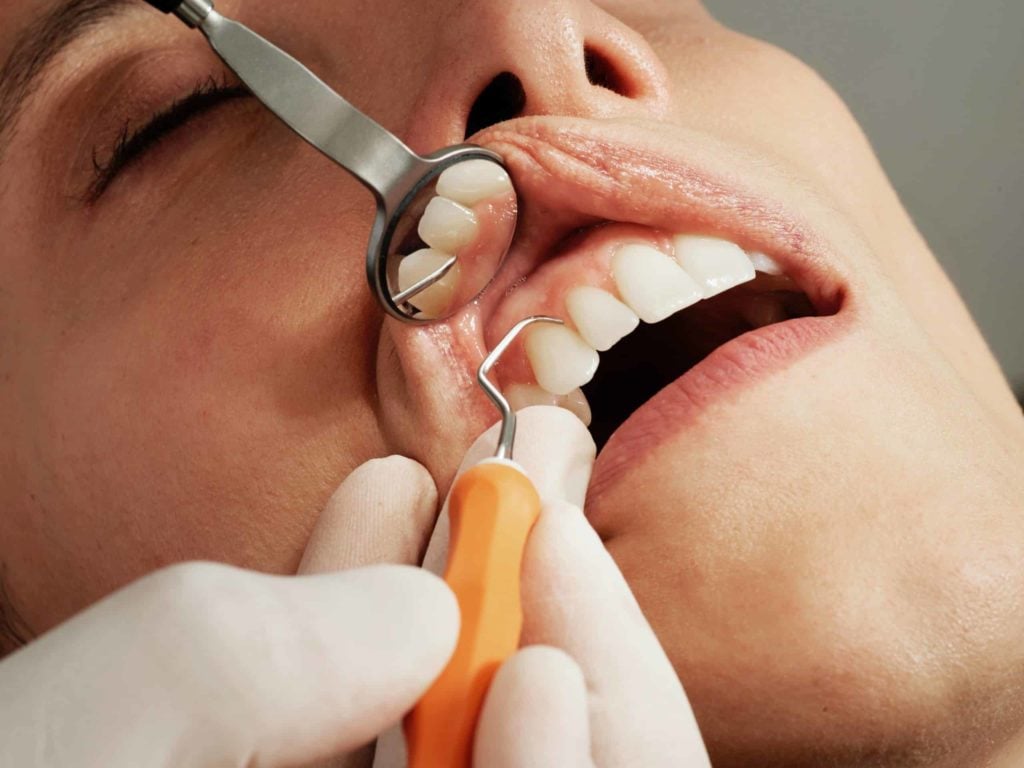Keeping your gum health in tip-top shape is one of the most important steps to ensure that your mouth stays healthy for years to come. Gum disease will make your mouth hurt and can even make it painful to eat making it all the more important to keep your gums healthy and well maintained!
We’ve got several steps lined out to keep your gums healthy and some of the primary causes to poor gum health.
What Do Healthy Gums Look Like?
Before we can go too far into how to keep your gums healthy, it’s important that we define what healthy gums are. More often than not, patients visit the dentist, not even knowing that they’re struggling with gum disease. Patients often make a dental appointment for more visible dental-related issues or regular cleaning. When they get to their appointment, the dentist can quickly find gum disease.
Gum disease can be responsible for tooth pain and early tooth decay. If it’s not treated and taken care of, it can lead to serious health issues and even cause decay in facial bones such as the jaw.

Potential Symptoms of Gum Disease
- Gums bleeding during and after tooth brushing
- Red, swollen, or tender gums
- Persistent bad breath, or a bad taste in the mouth
- Receding gums
- Formation of deep pockets between teeth and gums
- Formation of deep pockets between teeth
- Loose or shifting teeth
- Changes in the way teeth fit together upon biting down
If you have experienced any of these issues, it doesn’t mean that you have gum disease for sure. However, make sure you bring any of these symptoms up to an oral hygienist at your next dental appointment.
Gingivitis vs. Periodontal (Gum) Disease
There are two general types of gum diseases: gingivitis and periodontal (gum). The first, gingivitis, is the milder of the two, and it’s often characterized by swollen or inflamed gum tissue. You might have mild forms of gingivitis if your gums bleed when you’re brushing them. Gingivitis can be more easily and quickly healed by changing some of your everyday habits—more on this to follow.
Periodontal disease is a bit more intense and should be taken more seriously. Periodontal disease is gum damage that can lead to tooth loss and serious health issues in the body if not treated and taken care of efficiently. Signs of periodontal disease include gum pockets, gum recession, and tooth or bone decay. In severe cases, the damage can be seen better with the help of x-rays.

What Happens If You Have Gum Disease?
When gum disease is left untreated, it can result in tooth loss and other serious health issues, including heart and lung problems. Your mouth is the gateway to your body in many ways. Bacteria builds up through gum disease and can spread into different parts of your body. After entering your airways, bacteria can make its way to your bloodstream.
This is just one of the reasons why maintaining a healthy mouth is so important and something that shouldn’t be neglected at all.

How to Heal Your Gums
Reversing and promoting healthy gums is an important part of ensuring that your mouth stays healthy and that you’re able to keep living unaffected. But, when your gums do start to develop gingivitis or mild periodontal disease, here are a few ways that you can start treating it.
Reversing Gum Disease
After you’ve noticed your gum disease, you’ll have to start taking steps to get rid of it. You can start by making some changes to your lifestyle and through the use of gum disease treatment. Your local dental provider can be a huge help in getting your gum disease treatment started. One change you can make is cutting out sugary foods and starting to brush your teeth on a regular basis.

Promote Healthy Gums
After you’ve started to reverse and heal your gum disease, you’ll need to start promoting healthy gums by taking care of them. This means brushing your teeth at least twice a day using toothpaste that contains fluoride. Fluoride helps to rebuild your tooth enamel and ensures that you have natural protection against tooth decay. You’ll also want to floss regularly and use mouthwash. Some mouthwash solutions will help fight gum disease, but any mouthwash will be an advantage in your fight for healthy gums.
Foods That Promote Gum Health
You should also be eating a diet that is high in vitamin C and calcium. Foods like oranges and spinach are good natural ways to get vitamins and minerals into your body to help your teeth replenish their natural enamel and strength. Vitamin C can also help your body fight off any bad bacteria that starts to form in your mouth.

Natural Ways to Maintain Gum Health
In addition to taking gum disease treatments and following up with a healthy diet, there are some other things that you can do on your own at home to help maintain gum health. Here are a few of those simple ways that you can take action towards a healthier mouth.
Common Ways to Keep Gums Healthy
- Floss regularly
- Regular dental cleanings
- Brushing twice a day
- Fluoride toothpaste
- Preventative or restoring mouthwash
- Drink lots of water
There are more ways, such as eating a healthy, nutrient-dense diet, as we mentioned above. But, these are some of the best daily habits that will help keep your teeth clean and your mouth free of gum disease.

Avoiding Gum Disease and Keeping Your Mouth Healthy
Of course, you need to heal gum disease when you get it. But keeping your mouth healthy and avoiding gum disease is even more important! Here’s a breakdown of the tried and true ways.
Brush for at Least 2 Minutes
First, we’re going to knock off an obvious tip. When you brush your teeth, make sure you’re hitting up each side for at least one minute each. A good way to do it is to spend 30 seconds in each quadrant of your mouth brushing. (For those who are looking to upgrade their toothbrush – Quip has an electric toothbrush that will alert you when to move on to a different section of your teeth).
Keep this in mind too — as this is where many people fail when it comes to cleaning their teeth — make sure you brush your gums lightly as well. This will help keep your gums healthy and clean.
Floss Daily
The importance of flossing is currently widely debated. We’re here to tell you that flossing is definitely worth the extra effort.
By flossing, you can get in between your teeth in the hard-to-reach areas of your mouth to get rid of any plaque build-up.
Recent articles have pointed to there not being evidence supporting the benefits of flossing. Dr. Tim Lafolla, a dentist and public health analyst at the National Institute of Dental and Craniofacial Research, said it best in a Live Science article, stating “Weak evidence for flossing doesn’t necessarily mean that flossing is ineffective, it just means there isn’t positive evidence for flossing. Flossing is a low-risk and low-cost procedure, and because clinical studies show that it’s effective when it’s done well, we just don’t have much hesitation in saying go ahead and do it. It’s not going to hurt.”
So go ahead and floss. It’ll be worth it in the long run.

Use Mouth Rinse Daily
If you’re not flossing, then you better at least be using mouth rinse daily. Swishing an antiseptic mouthwash at least two times a day can help stop gingivitis in its tracks and keep your mouth fresh and disease-free.
The standard amount of mouthwash to use is 20 ml. It is also recommended that you spend 30 seconds swishing it around in your mouth.
Eat a Healthy Diet
You may be surprised to learn that there are some foods out there that can improve the health of your gums.
Here’s a quick list of good foods for your mouths health.
- Onions
- Leafy greens
- Green tea
- Peppers
- Citrus fruit
- Shiitake mushrooms
- Celery
- Carrots
- Apple
Even some dairy products have all been linked to gum health.
What Causes Gum Disease?
Gum disease occurs when there’s inflammation of gum tissue due to many factors, including plaque, decay, or injury. Plaque builds up on teeth from everyday things like eating food and drinking acidic or sugary beverages. Decay occurs when the plaque on teeth turns into acid and eats away at your tooth enamel, causing cavities. Plaque builds up naturally, but when it isn’t removed regularly, it can become more of a problem.
Injury to gum tissue can also occur if you’re grinding or clenching your teeth, biting down too hard with braces, or have a mouth injury that leads to gum inflammation. This inflammation, if left unchecked, can lead to more serious issues and turn from a simple case of gingivitis into more severe periodontal disease.

Here are the main culprits that cause gum disease:
Smokeless Tobacco and Cigarettes
Using tobacco is one of the worst things you do for your gums — aside from completely avoiding brushing your teeth altogether.
Tobacco can lead to the following adverse side effects for your oral health:
- Bad breath
- Teeth discoloration
- Decreased sense of smell and taste
- Greater risk of developing cavities
- Smokeless tobacco products, just like cigarettes, contain at least 28 cancer-causing chemicals.
- Smokeless tobacco is known to cause cancers of the mouth, lip, tongue, and pancreas.
- Users also may be at risk for cancer of the voice box, esophagus, colon, and bladder, because they swallow some of the toxins in the juice created by using smokeless tobacco.
- Smokeless tobacco can irritate your gums, causing gum (periodontal) disease.
- Sugar is often added to enhance the flavor of smokeless tobacco, increasing the risk for tooth decay.
- Smokeless tobacco typically contains sand and grit, which can wear down teeth, causing tooth sensitivity and erosion.
As you can see, the risk of tobacco goes beyond just your gums.
The gum around your teeth is the first line of defense against harmful bacteria and toxins. If you’re regularly using tobacco products, it can increase the likelihood that gum disease will develop in your mouth by up to 50%.

Junk Foods That Are High in Sugar
Sugar is bad for your gum health. Your teeth are made of calcium, and when sugar reaches those tooth enamel layers, it can cause the mineral to break down. Over time high amounts of sugar in your diet will cause significant problems for your gum health.
Dry Mouth
When your mouth doesn’t have enough saliva, gum disease becomes more likely, thus damaging overall gum health. This is because of the lack of moisture, allowing bacteria to grow and gum disease to worsen. One of the most common reasons people suffer from dry mouth is not drinking enough water or sleeping/breathing with their mouth open.
Poor Oral Hygiene
This one may not be much of a surprise, but poor oral hygiene habits are the leading causes of gum disease. When you don’t brush your teeth regularly, or you don’t floss, gum disease can worsen—performing proper oral hygiene daily does more than just keep your teeth white.
Regular Checkups for Cleanings
It’s important to make sure that every six months, you’re visiting the dentist for a cleaning and to make sure that everything checks out. If gum disease has already started to form, it’s important that you take care of the problem as soon as possible. This is where a dentist comes in and can help start providing treatment for you. In many cases, a one-time treatment is all you’ll need to start healing your gums.
While many people don’t like going to the dentist, here at Wayzata Dental, we offer pain-free oral examinations. We aim for every procedure to be minimally invasive and strive to provide a safe, clean, and relaxing environment in which to have dental work done, including basic oral examinations.
To schedule you’re next oral examination with Wayzata Dental, call 952-473-4900 or book online here.


